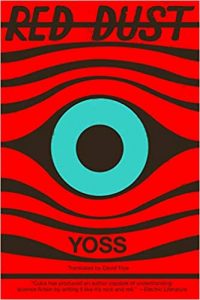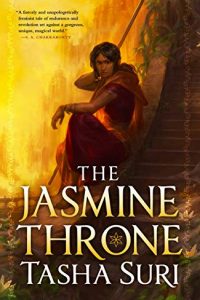Ian Mond Reviews Red Dust by Yoss
 Red Dust, Yoss (Restless Books 978-1632062468, $16.99, 208pp, tp) July 2020.
Red Dust, Yoss (Restless Books 978-1632062468, $16.99, 208pp, tp) July 2020.
Red Dust, Yoss’s latest novel to be translated into English, is an entertaining yarn narrated by a positronic robot (or “pozzie”) named Raymond in honour of its favourite author. Alongside its fellow automatons, Raymond guards the corridors and docking bays of space-station, the William S. Burroughs, under the eagle-eye of the Galactic Trade Confederation, and its member races: the humanoid Cetians, the insectoid Groddo, and the brutish Colossaur. As Raymond informs us, the Confederation view humanity as “a stupid and very dangerous race who have to be kept in check;” as such, the Confederation is only willing to do business with humans provided there’s no sharing of high-tech (like hyperspace travel or artificial gravity) and these trades are restricted to our solar system (the Burroughs orbits Titan). Against this backdrop Raymond and his pozzie associates do a serviceable job keeping peace on the station, that is until two bounty hunters bring onboard a dangerous, sociopathic Cetian named Makrow 34. When the Cetian is rescued by his accomplices, leading to the deactivation of two pozzies, Raymond is tasked with hunting down the fugitive. He learns, though, that Makrow 34 is not only a Psi but the most exotic variety, namely a Gaussical. This means he can alter the “statistical probability of any number of events,” such as causing a sharpshooter to miss their target, or more improbably having it rain inside the station. In confronting the challenge Makrow 34 poses, Raymond takes a leaf from the movie 48 Hours (“use a bad guy to trap another bad guy”) and secures a Gaussical of his own – small-time crook Vasily Fernandez.
Red Dust is described (on the back cover) as an homage to Chandler, and while Raymond does wear a trench coat and broad-brimmed hat in honour of Humphrey Bogart’s take on Philip Marlowe, Yoss avoids the pitfalls of aping Chandler’s similes or reworking the author’s work. The novel does begin with Raymond mimicking Chandler (“The desert wind was blowing that night, loaded up on red dust like a drunk on whiskey”) but only to contrast the stuffy conditions of the station with Chandler’s stylised version of Los Angeles (“there are no real bars on the Burroughs“). Similarly, while it’s clear that Chandler’s canon, which Raymond has read countless times, acts as a touchstone, giving the robot a sense of self, a sense of purpose – including a moving scene where Raymond narrates two of the author’s novels to Vasily to keep his companion sane while they float helplessly in space – references to famous books like The Big Sleep are, thankfully, used sparingly. Red Dusts‘s literary influences also don’t stop at Chandler. Asimov is name-checked (obviously, so is Burroughs) and there’s a certain Frederik Pohl or Alfred Bester vibe to the setting, while the chaotic climax reminded me of Roger Zelazny at his most imaginative. Beyond these influences, Red Dust is still very much a Yoss novel. In terms of the general premise and structure, it’s a little more conventional than Condomnauts, yet the book features Yoss’s knack for imagery, such as his vivid description of Romani Chieftain Old Man Slovoban (a key player in the unfolding plot). I also appreciated Yoss’s character-work: Raymond is a delight – not overly robotic, but also not entirely human – and the buddy/cop relationship with Vasily is handled with a good dose of humour and heart.
Kudos then to Restless Books, who have now translated four of Yoss’s novels from Spanish into English – by the wonderful David Frye – with the most evocative and eye-grabbing of covers. It’s a privilege to read the work of a writer as inventive and erudite as Yoss, but it wouldn’t be possible without the terrific support of publishers like Restless Books.
This review and more like it in the August 2020 issue of Locus.
©Locus Magazine. Copyrighted material may not be republished without permission of LSFF.
 While you are here, please take a moment to support Locus with a one-time or recurring donation. We rely on reader donations to keep the magazine and site going, and would like to keep the site paywall free, but WE NEED YOUR FINANCIAL SUPPORT to continue quality coverage of the science fiction and fantasy field.
While you are here, please take a moment to support Locus with a one-time or recurring donation. We rely on reader donations to keep the magazine and site going, and would like to keep the site paywall free, but WE NEED YOUR FINANCIAL SUPPORT to continue quality coverage of the science fiction and fantasy field.






